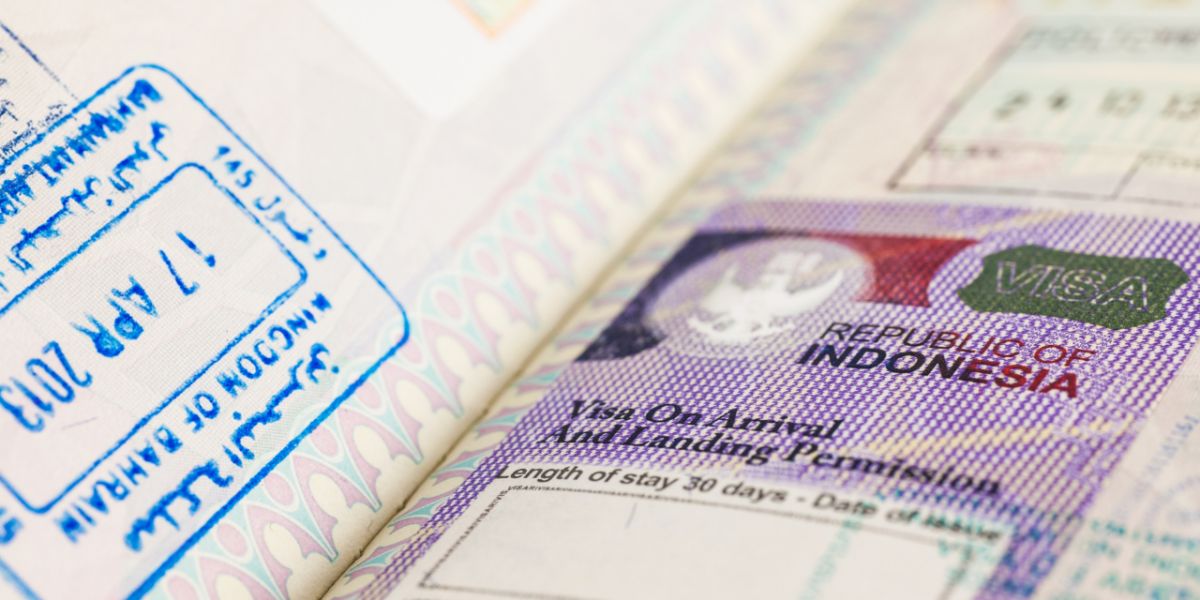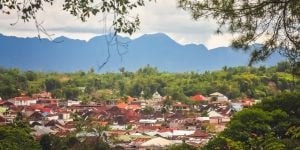

Regardless of the mode of transportation you use to enter Indonesia, you will always need a visa that will allow you to officially stay in the country for more than 60 days. The 60-day limit is the maximum duration of stay for non-resident visitors through the single-entry visit visa. This type of visa is renewable 5 times.
Those traveling to Indonesia should be aware that certain types of visas have been suspended until further notice by the authorities following the Covid-19 pandemic in the country. This is the case for visa exemptions and visas on arrival (VoA). Visitor visas, including tourist visas, are still available.
In accordance with government regulations on COVID-19, foreign nationals holding the following types of visas are currently allowed to stay in Indonesia:
- Service Visa
- Diplomatic Visa
- Diplomatic Residence Visa
- Limited Visit Visa (B211A or B211B)
- Limited Stay Visa (ITAS)
- Service Permit
- Diplomatic Residence Permit
- Limited Residence Permit (KITAS)
- Permanent residence permit (KITAP).
Kartu Izin Tinggal Terbatas (KITAS)
KITAS are different types of visas for limited stays in Indonesia. A KITAS visa allows you to stay in Indonesia for two years and costs USD 160 (USD 50 for six months, USD 90 for one year). It can be extended for two years at a time and allows you to stay in the country for up to six years.
However, there are different types of KITAS visas. Each of these categories of KITAS visas has specific conditions and costs. For example, there is a KITAS for expats who are married to an Indonesian citizen, another KITAS for those who are visiting family, and another KITAS for those who only want to work in Indonesia for a few years.
This type of visa is suitable for foreigners who plan to stay in Indonesia for purposes such as work, investment, research, study, family reunion or long term immigration. The KITAS visa is applied for at the Indonesian embassy or consulate closest to one's country of residence. Alternatively, a guarantor based in Indonesia may apply on behalf of the beneficiary at the Directorate General of Immigration in Jakarta.
Regardless of the purpose of your stay in Indonesia, we strongly recommend that you contact the nearest Indonesian embassy for more information on the latest requirements specific to the type of KITAS you wish to obtain.
Limited residence visa to work in Indonesia
In Indonesia, changes in government regulations have made it harder for foreigners to work in the country since the early 2010s. This does not stop many foreigners from taking the plunge every year, but you should be aware that you cannot simply land in Indonesia and freely go looking for a job. Indeed, only expatriates sponsored by a company can get a job in Indonesia. In other words, only those whose employment is already secured can enter the country and start work right away.
In the past, in order to work legally in Indonesia, one had to first apply for a work permit (IMTA). Only after the application was approved, the Indonesian immigration authorities would issue the limited stay permit (KITAS). The IMTA has now been replaced by a Notification issued by the Ministry of Manpower, for which companies wishing to employ a foreign national must apply. The procedure is essentially the same for both, except that the Notification is issued more quickly and allows companies that apply to pay automatically at the time of application.
Like the IMTA, the Ministry of Labor Notification allows you to work full time and receive a salary in the country. As you may have understood, this is also another kind of work permit. Please note that before a company can employ an expatriate worker, it must first obtain an RPTKA license (expatriate placement plan). Contraveners risk a fine of up to IDR 500 million and five years' imprisonment. Therefore, you should be made aware of all the requirements for living and working legally in Indonesia.
Furthermore, to be eligible for a work permit, the applicant must have the appropriate qualifications and/or prove five years of work experience in a relevant position.
The following is a basic list of documents that must be submitted to apply for a work permit in Indonesia. This list is subject to changes, depending on the citizenship of the applicant:
- A completed application form
- A letter of guarantor
- A document approving your company's proposal for foreign labor - issued by the Indonesian Ministry of Manpower and Transmigration (MOMT)
- A copy of the applicant's passport
- A copy of recent bank statements
- Passport size photos (recent)
- Applicant's resume and letters of recommendation
- Proof of health and life insurance valid for the entire stay in Indonesia.
To receive a work permit in Indonesia, the hiring company will have to submit the following documents:
- its tax identification number
- its registration certificate on the business registry
- its organizational structure
- a letter of appointment from the visa applicant.
All companies recruiting foreign experts are also subject to a mandatory interview at the Ministry of Manpower to obtain the legal documents necessary to apply for a work permit.
It should also be pointed out that foreigners can only work in Indonesia if their employment is justified to the authorities by the company hiring them. The justification must establish that there is no Indonesian citizen available for the job in question. In addition, foreigners can only apply for specific positions and can only work in Indonesia for a limited period. In order to protect local employment, the authorities have also established a list of jobs that are not open to foreigners for certain economic sectors, mainly those that were part of the Negative Investment List.
Indeed, Indonesia was one of the few countries in the world to have established a Negative Investment List, a list of sectors where foreign investment is not desired (i.e., prohibited). The ban also affected the employment of expatriates in these sectors, although this was not really official. The government has, however, softened its approach in 2021, renaming this list the Positive Investment List and opening all economic sectors to foreign investment in an effort to boost economic recovery from the Covid-19 pandemic. There are still 6 sectors prohibited for foreign investors, but these are mostly activities that are already illegal in Indonesia. The sectors in question are the cultivation of narcotics, the fishing of endangered marine species, the manufacture of chemical weapons, the management of casinos or gambling, the production of chemicals that threaten the ozone layer, or the exploitation of coral for the manufacture of houses, jewelry, or other.
This openness to investment should also naturally lead to a softening of employment conditions for foreigners in Indonesia. However, given the current pandemic situation, nothing can be certain at this stage. Some Indonesian regions are still facing numerous cases of Covid-19 infection, and travel restrictions, as well as conditions, are still not ideal. Therefore, expats will have to wait for the final opening of Indonesian borders and the end of the pandemic emergency to know for sure. But the current economic difficulties suggest that the authorities have every interest in reducing employment restrictions on expatriates in the near future, just as they have done with foreign investment. It is estimated that there are currently about 350,000 expatriates living in Indonesia. Certainly not all of them are retirees.
Limited Stay Visa for international students in Indonesia
If you are planning to study at one of the higher education institutions in Indonesia, it is best to start the visa application process as soon as you receive your acceptance letter.
The following documents are usually required when applying for a visa:
- A copy of your passport that is valid for at least six months after the completion of your course of study in Indonesia
- A completed application form
- Passport size photos (recent)
- A copy of your return/continuation tickets to another country
- The official acceptance letter from your host university in Indonesia, confirming the duration and nature of the course of study
- A letter to the nearest Indonesian embassy from your host university in Indonesia confirming your need for a visa
- Receipts proving that all fees have been paid in advance. If you have received a scholarship or award, you will need to submit a letter of confirmation
- A copy of your recent bank statements to prove that you have sufficient funds to cover your living expenses on site
- A letter of recommendation from the Department of Education and Culture.
Limited residence visa for research
Foreign researchers who are invited to conduct research in Indonesia must first obtain an official permit from the Indonesian authorities.
When considering conducting research in the country, you can download and complete all documents through the online portal of the Ministry of Research and Technology of Indonesia.
After reviewing and approving your application for a foreign research permit (TKPIPA), your visa will be made available at the nearest Indonesian embassy. You can then travel to Indonesia, where the official permit will be issued when you report to the Research Permit Secretariat for Foreigners, located in Jakarta.
Hereafter is a list of documents to be submitted to apply for the Limited Stay Visa for Research in Indonesia:
- A copy of your passport that is valid for at least six months after the end date of your research in Indonesia
- An official letter of request for research in Indonesia, a copy of which must be sent to the Indonesian embassy or consulate from which you plan to pick up the visa prior to your travel
- A detailed copy of your research proposal, which should include your objectives, field research locations, and working methodology
- A copy of your CV, including a list of publications
- Three letters of recommendation: one from a senior researcher in your field, one from an academic, and one from an Indonesian representative
- Letter(s) of acceptance from the relevant Indonesian academic institution and/or research center
- A copy of your recent bank statements to prove that you have sufficient funds to cover living and other expenses during your stay in Indonesia
- A medical certificate to prove that you are in good physical and mental health
- Passport size photographs (recent)
- A list of equipment you plan to bring to Indonesia, with their value stated in U.S. dollars
Useful links:
We do our best to provide accurate and up to date information. However, if you have noticed any inaccuracies in this article, please let us know in the comments section below.








